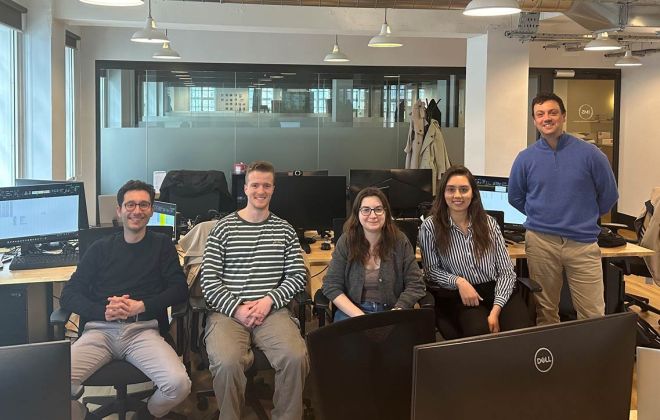
Pitching for new business can be a highly competitive process. And these days it’s about more than just supplying the right product at the right price.
As Beaconsfield-based consultancy Independent Marketing Sciences (IMS) has discovered, larger clients are increasingly looking to their Corporate Social Responsibility (CSR) policies when selecting suppliers. One crucial element is managing your carbon footprint, and with the help of the Net Zero Bucks team at Buckinghamshire Business First, IMS are both going green and staying competitive.
IMS Overview
Independent Marketing Sciences (IMS) is a consultancy specialising in data science and ‘econometrics’. Utilising advanced statistical models to measure the effectiveness of advertising, they analyse large datasets to help clients optimise marketing budgets - a particularly hot issue when the economy is struggling, as Founder Alex Vass explains: “If a client is putting £5m into a TV commercial or Google ads, they want to know it’s driving sales, and if they’re forced to make cuts, they want to be sure they’re cutting the stuff that’s less effective.”
CSR, complexity and the need for proof
Since its 2019 launch, IMS has grown from a one-man-with-a-laptop operation to a 13-strong workforce. Inevitably, growth has involved many sales pitches, and they haven’t all been successful. Alex recalls a major client who scored them poorly on CSR despite his best efforts to build an ethical business. “I was like, ‘why are we failing badly on CSR?’ We have an electric car. We have green energy suppliers.”
Clearly, CSR was adding a new layer of complexity to the pitching process. Corporate Social Responsibility refers to efforts companies make to ensure they’re having a positive social impact. It includes things like charitable giving, anti-slavery policies, and conservation efforts. The key, as IMS learned to their cost, was turning those efforts into measurable metrics. Noble sounding policy statements are not enough.
The carbon conundrum
Since then, IMS have worked with CSR specialists to make improvements in many areas, but on some green issues the road was harder to travel. IMS faced particular challenges evaluating their carbon footprint.
“It’s difficult for a business like this”, said Alex. “We’ve only got 13 people. Most of us work from home and the only thing we really use is computers. So I had no idea what our carbon emissions were.”
Understanding, never mind managing, their carbon output was proving elusive.
Towards a solution with Net Zero Bucks
Luckily, IMS reached out to Buckinghamshire Business First and our Net Zero Bucks team to help solve the problem. So, what are we doing?
Net Zero Bucks provides organisations with a comprehensive programme to precisely calculate their carbon emissions and develop a reduction plan rooted in the latest climate science and science-based targets (SBTi). After all, if you can’t measure them, you can’t improve them.
Following a detailed interview and assessment, Net Zero Advisers have provided IMS with a comprehensive Net Zero Report detailing both the sources of their emissions and areas for improvement. Net Zero Bucks identified an annual surplus of 50 tCO2e (tonnes of carbon dioxide equivalent) for IMS to offset. Continued access to a Carbon Calculator to measure ongoing improvements is part of the programme.
Alex is in no doubt about the impact that Net Zero Bucks has had.
"The Net Zero Team at Buckinghamshire Business First has been instrumental in incentivising IMS on our net zero journey. We have now pledged to become net zero by 2030 (a reduction of approximately 46 tonnes), with two staff members certified as Carbon Literate. Our social media channels and website have been updated to reflect and celebrate this commitment.
"Additionally, we are in the process of implementing our own carbon analytics platform to assist our clients in calculating their emissions related to their advertising activity, which we hope will bring a 10% increase in revenue, but more importantly lead to bigger carbon reductions for them in their advertising than we could ever do by just looking at ourselves.
"The highlight of 2024 however was winning the Net Zero Ambition Award at the Buckinghamshire Business Awards”
Future action
One potential area for gains is data storage. Data has its own carbon footprint, though this is often invisible because it’s stored in the cloud. There are an estimated 7.2m industrial-scale data centres around the world, each one hungry for electricity and water. Lancaster University estimates the cloud is responsible for up to 1.5% of global greenhouse gas emissions.
Both the amount of data and the way it’s stored is important. In IMS’s case, their business requires them to process huge data files – one company alone sent them 110 million rows of data. Fortunately, not all cloud-based data centres are built alike. Some are powered by green energy and employ less energy intensive technologies such as serverless, open-source software. That’s something the Net Zero Bucks team can advise on.
In the meantime, IMS will look to offset their emissions through the planting of trees. “We have to plant 50 to 100 trees a year to be Net Zero and I think we’ll probably plant double that amount to be 100% on the right side of things,” said Alex.
Collaborating with Net Zero Bucks pays off
IMS have embraced CSR as both an ethical guide and a business necessity. Collaborating with the Net Zero Bucks team to measure and reduce their carbon footprint, and address the environmental impacts of data storage, they are now well positioned to meet client expectations and pitch for contracts with confidence.
Get in touch for support
The Net Zero Bucks programme has now come to a close. But there is still support available for businesses wanting to reduce their carbon emissions, save money, minimise waste, and progress on their journey to net zero. Contact our team for more information: email [email protected] or book in a chat via this online form.
Buckinghamshire Business First's Net Zero Bucks was funded by the UK government through the UK Shared Prosperity Fund, managed by Buckinghamshire Council.